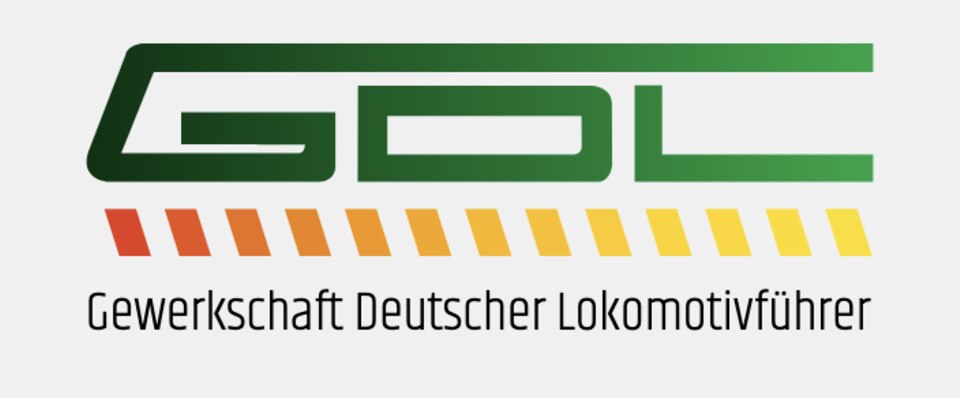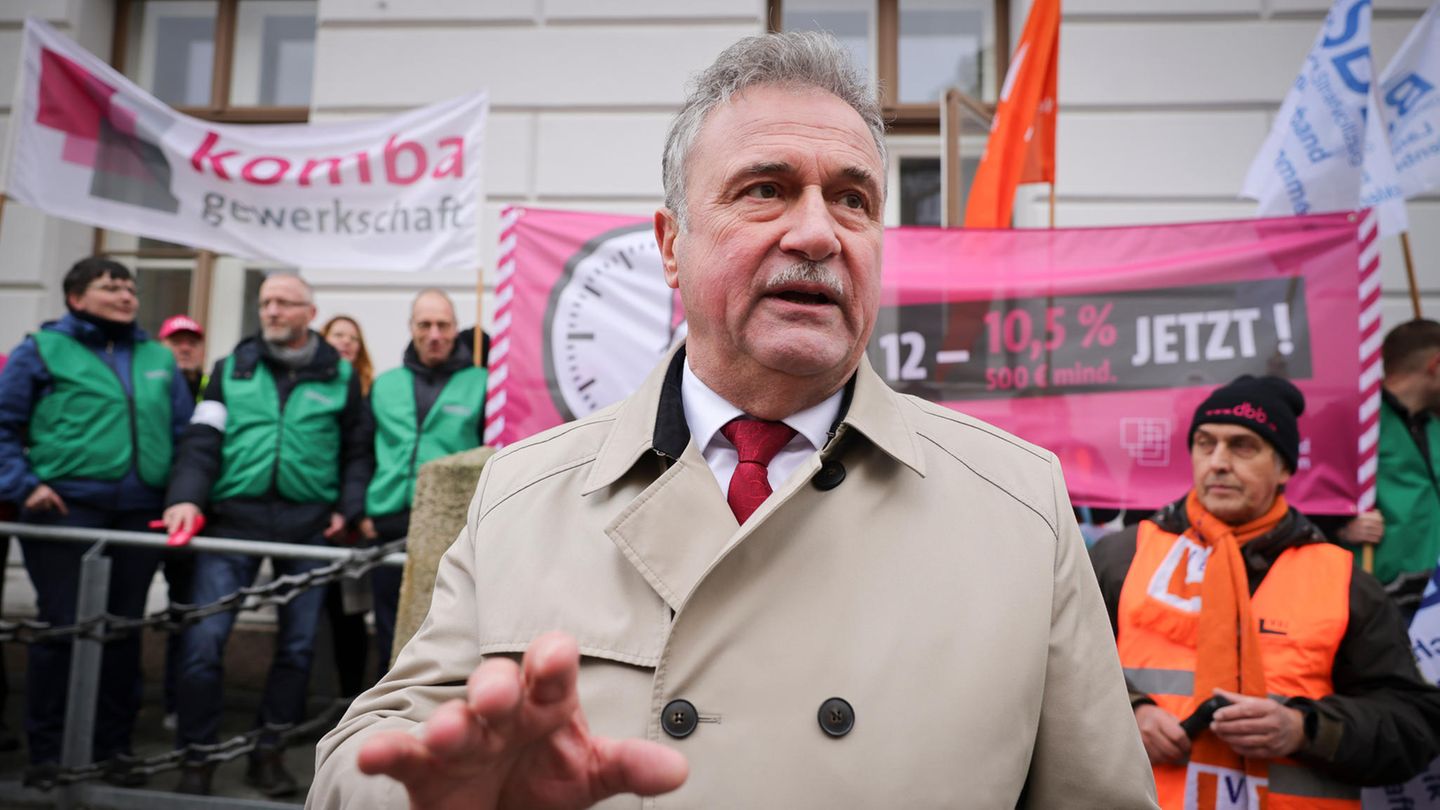With the Fair Train cooperative, high-ranking officials from the train drivers’ union GDL are trying to push through higher salaries – and in doing so are enraging the railway.
The logos of the German Locomotive Drivers’ Union (GDL) and the train drivers’ cooperative Fair Train look quite similar: green font, a bold line above the letters and red and yellow boxes underneath that are reminiscent of rails. This is not a pure coincidence, as there are also overlaps in the management levels of both organizations.
Fair Train lends train drivers to other companies, including theoretically: Deutsche Bahn (DB). In the best case scenario, she should buy the loaned train drivers for more money than they would earn if they were employed by the railway. The company sees this as a trick to push through salary increases – and has considerable doubts that this practice is permitted. That’s why the railway is now suing the Hesse State Labor Court.
Strikes are planned again from Wednesday to Friday (January 10th to 12th), and the break announced by GDL chairman Claus Weselsky will then be over. The railway’s first attempt to prevent the strikes in court this week failed. But Fair Train is being negotiated in a different process. With this legal trick, the railway could deal a bitter blow to the GDL in the long term and even prevent strikes in the future. But how promising is that and who is actually behind Fair Train?
The entire GDL board founded Fair Train
“The railway workers will gradually take their fate into their own hands in the future,” was the declaration of war by the outgoing GDL federal chairman Weselsky last summer when he announced the founding of Fair Train eG. Specifically, railway workers should, for example, resign from Deutsche Bahn in order to then be employed by Fair Train as a registered cooperative (eG) under better conditions and – after a statutory blocking period of six months – from there to be loaned out again to the railway or other railway companies. Fair Train had received permission to provide temporary employment. In September she signed a collective agreement with the GDL to “counteract the negative development in social standards in the railway market”.

The railway, in turn, complains: “When the union founded its temporary worker cooperative, it also became an employer and essentially negotiated and concluded a collective agreement with itself.” This is an impermissible self-dealing with significant conflicts of interest.
Above all, there are strong personal connections. In fact, the entire GDL executive board is one of the founding members of Fair Train. The deputy federal chairmen of the GDL, Lars Jedinat, Lutz Schreiber and Mario Reiß, are all three members of the Fair Train supervisory board. Reiß is even chairman of the supervisory board – but at the same time will soon replace Claus Weselsky at the top of the GDL. Weselsky himself does not hold any office at Fair Train, but is also one of the founding members. The former GDL managing director Thomas Schütze is now a member of the Fair Train board.
Anyone can become a member of Fair Train since June 2023 – but only if he or she is also a member of the GDL. The cooperative had announced that it would begin rental operations at the end of 2023. But railway circles say that so far neither a railway employee has resigned because of this nor has anyone been hired out by Fair Train. There is also no sign of any greater interest in changing jobs. Fair Train informed Capital that it had signed the first employment contracts. Due to the notice periods that must be observed, the rental is unlikely to begin until April 2024. The GDL left a capital request unanswered.
Labor lawyer: “No one has had this idea yet”
Labor lawyer Michael Fuhlrott is critical of being active as a union and as an employer at the same time, although he attests that the GDL has a certain creativity in this construction. “No one has had this idea before,” Fuhlrott told Capital. “Mr. Weselsky has ventured into a previously untrodden area of law. There is currently no specific case law for a case like this.” The law only regulates that unions can be founded, that they can strike and advocate for the wage conditions of employees. “When a union starts a company now, it is no longer typical union business – even if the goal is to improve wage conditions for employees.”
This dual role is problematic, says lawyer Fuhlrott. If there are conflicts between GDL and Fair Train in which Fair Train employees want to strike at their employer, the question arises: “Are you a union or a temporary employment agency?”
It is precisely this question that the railway now wants to have resolved in court through a declaratory judgment action. Because the GDL was therefore not prepared to talk at the negotiating table. “Unfortunately, the train drivers’ union has so far refused to clarify this crucial question at the negotiating table,” said DB Human Resources Director Martin Seiler. “Since she declared the negotiations to have failed and canceled further appointments, we are now forced to take this step.”
The railway hopes that the ruling will provide clarity. “We need to know with legal certainty whether we have a collective bargaining partner who is capable of acting. After all, we are in an ongoing collective bargaining round,” said Seiler. If the railways were to win, the GDL would lose its ability to negotiate. That would have serious consequences: it would then no longer be allowed to conclude collective agreements and, according to the railway’s argument, it would no longer have a legitimate strike target.
Old collective agreements could then also become ineffective. A court must also decide which exactly are affected. If the GDL notices in the process that things are not going in its favor, it could sell Fair Train or stop business operations completely in order to avoid being unable to negotiate a collective bargaining agreement. Other conceivable solutions would be agreements on who can be poached where, for example, or a separation of personnel.
The success of Fair Train would be an “existential danger” for Deutsche Bahn
Regardless of whose favor the verdict of the Hessian State Labor Court is, the other side will, in Fuhlrott’s opinion, probably go to the next instance and thus the Federal Labor Court. Labor law expert Fuhlrott also believes it is possible to go to Karlsruhe before the Federal Constitutional Court, as it involves constitutional legal positions. A final decision could therefore only be made in several years.
Ultimately, the railway would also have to accept a positive judgment for the GDL. If the Fair Train model is actually successful, it would, on the one hand, significantly increase the popularity of the GDL, which is in constant competition with the much larger Railway and Transport Union (EVG). On the other hand, it would be an “existential danger” for the railway, says Fuhlrott. “If the railway has to hire train drivers from Fair Train for significantly more money, this will lead to higher wage levels across the entire railway market.”
So far there has been little impact on the next strikes
So what happens next in this dispute? According to the court, it is not yet clear when the trial will begin in Hesse. Normally, the opposing side has one month after receipt of the lawsuit to take a stand before the judge sets a date for the start of the proceedings. How this will be handled in the case of the railway against the GDL is not yet clear, a spokeswoman for the Hessian State Labor Court tells Capital.
The lawsuit will have little impact on the announced strikes anyway. An urgent application by the railway to prevent it in court was rejected in the first instance on Monday evening. The railway also argued that the GDL may not be able to negotiate tariffs. The presiding judge said that the GDL was “not obviously incapable of collective bargaining”. This rapid procedure must be based on obvious illegality, which is currently not the case.
Deutsche Bahn has filed an appeal and is now taking the matter to the state labor court. Only if it fails here too will passengers have to prepare for far-reaching restrictions from Wednesday.
This article appeared first which, like stern, is part of RTL Deutschland.
Source: Stern




